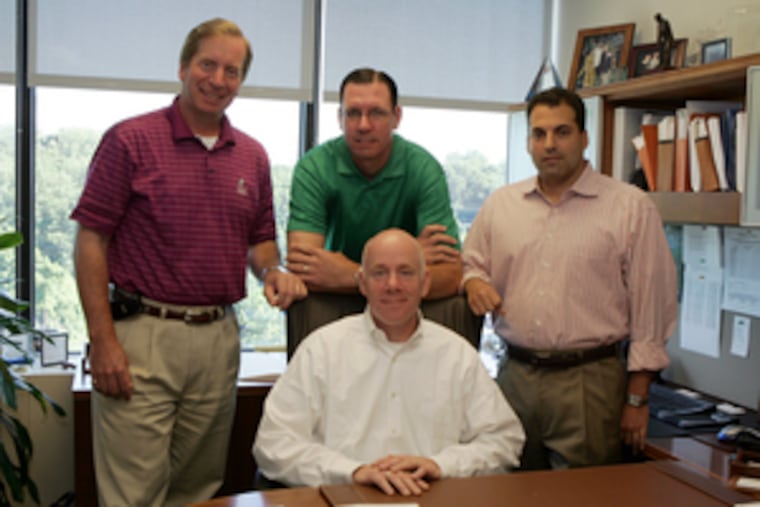NewSpring Capital thrives in unlikely environment
Michael DiPiano and Marc Lederman did what investors are supposed to do: they bought low, almost at the bottom of the dot-com bust in 2000.

Michael DiPiano and Marc Lederman did what investors are supposed to do: they bought low, almost at the bottom of the dot-com bust in 2000.
Today, thanks to their nerve back then and a lot of time spent picking over local start-ups, their Radnor-based NewSpring Capital L.P. has grown into a $500 million venture firm with holdings ranging from online technology to food packaging, while staying rooted in a region not known as a venture capital center.
"We invest in places we can reach from Philadelphia International Airport on US Airways," said NewSpring general partner Glenn T. Rieger, a former banker.
NewSpring's first fund, NewSpring I, has returned $270 million so far to investors who put up $135 million. That kind of payback helped persuade investors to back four additional funds since 2002, bringing NewSpring's total investment commitments to around $500 million.
The group's newest and largest fund, NewSpring Ventures II, plans to announce this week that it has raised $165 million from the Pennsylvania State Employees' Retirement System (SERS), the New York City fire, police and teachers' pension funds, and private investors from Wall Street to Silicon Valley.
It's the first NewSpring investment by SERS, which has an unusually large focus on private-equity investments and which has had mixed returns from other Pennsylvania-based investment managers. NewSpring funds have invested in 40 companies, all told.
The new fund could face a tougher environment than NewSpring's original fund, now that capital markets have slowed again.
Losses are inevitable, although none has been written off yet, said DiPiano, a former executive at Baxter International Inc. before he went into the small-companies investment business.
In some investments, such as a position NewSpring took in RippleTech Inc., a Conshohocken business software firm that's negotiating its sale to NitroSecurity Inc. of Portsmouth, Maine, "we just about make our money back," DiPiano said.
Still, it's a far cry from the fund's early days, when NewSpring watched its first $16 million turn into just $3 million in the tech-stock collapse.
NewSpring invests $5 million to $10 million in target companies that show $5 million to $50 million in yearly sales, said general partner Lederman, a former Deloitte accountant. The firm usually joins two to four other venture companies investing together to spread the risk.
"Hundreds of entrepreneurs can get their companies to $2 million a year. We want to see them grow to $5 million a year, a steady $1 million a quarter, before we invest. For that, they need a team that's deeper than the entrepreneur," Lederman said.
Once a firm assembles such a team, with a product and a market, "we fund them to expand their sales and marketing. We focus on execution risk."
Roger Hurwitz, a partner at Fidelity Ventures, the venture capital affiliate of Fidelity Investments in Boston, said he checks with NewSpring when he looks at potential investments in the mid-Atlantic region.
"They're very much a well-networked firm," Hurwitz said. "DiPiano has run a software business. He knows the space very well. We're always looking for high-quality partnerships, since we stretch across the country, and we've looked at a lot of deals with them. In fact, we're hoping to close a deal with them [soon]."
Among NewSpring's most profitable investments to date:
AppTec Inc., a medical-device testing company with a facility in South Philadelphia purchased earlier this year by Shanghai-based WuXi PharmaTech for $151 million.
Ecount Inc., a Conshohocken credit card program designer, sold to Citigroup last year for a price reported by The Inquirer at over $200 million.
NutriSystem Inc., Horsham, a publicly traded diet food distributor, which rose from less than $1 to over $70 in the first four years of NewSpring's investment, enabling NewSpring to return $110 million to investors as it cashed out part of its $3 million investment. The stock has since dropped below $20. Inquirer publisher Brian P. Tierney is a NutriSystem director.
"We made five times our initial investment on Apptec, 10 times on Ecount, and 40 times on NutriSystem," Lederman said.
DiPiano and Rieger worked in the 1990s with firms backed by Safeguard Scientifics, the Wayne company that hired and placed local dealmakers and invested in trendy market sectors under founder Warren "Pete" Musser from the 1950s through the 1990s.
While they've spread their risks along the East Coast, the partners say they like it when they can back Philadelphia-area firms so their 20-person staff can watch investments closely.
"Maybe 80 percent of what we do is also in Amtrak's Northeast Corridor," said Rieger, who joined NewSpring from the Radnor-based Cross Atlantic Capital Partners L.L.C., which raised $50 million from SERS in 2000-02 and have so far paid back about $15 million. "Go to a meeting in Boston, be home for dinner with the family."
Around Philadelphia, he added, "there's still a scarcity of early stage capital . . .. Entrepreneurs around here are used to funding their companies through family, angels, vendor finance."
"This whole community," DiPiano added, "is still a net importer of capital."